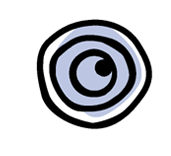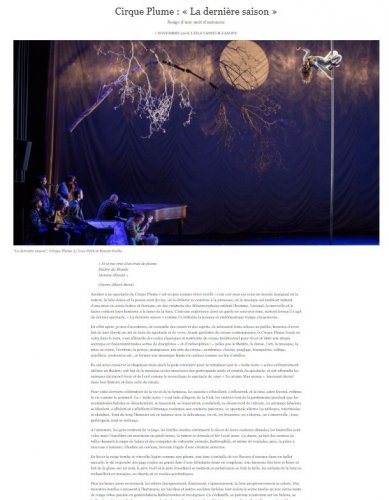Wall Street International Magazine1 November 2018
Cirque Plume : "La dernière saison"
A Mid Autumn Night’s Dream
"And I create myself with a stroke of a pen
Master of the World
Unlimited Man."
(Pierre Albert-Birot)
Attending a Cirque Plume show is a bit like experiencing a waking dream: to go is to see a marginal world before your eyes: one where nature, sweet madness and poetry are the motto, where comedy is combined with prowess, where music beats along a festive and enchanting staging, where creatures of Metamorphoses — mixing man, animal, wonder and fauna — tell their stories in the light of the moon. It is an experience that leaves fond memories, especially when it comes to the last show, "La dernière saison," as it’s been named by the joyful and emblematic circus troupe.
Indeed, after 30 years of adventures and of conquering hearts and minds, they bid farewell to the public, happy to have made their freedom into an art of performing and of being alive. Avant-gardists of contemporary circus, Cirque Plume, founded in 1983 in the Jura, has freed itself from the classical and restricted codes of traditional circus in order to dream and build a scenic utopia. The troupe has merged all sorts of disciplines — and indisciplines! — including theatre, dance, art, music, staging, writing and poetry, and has juxtaposed them with circus arts — acrobatics, clowning, juggling, trampoline, hand-balancing, contortion and so on — to form a mosaic as colorful as fireworks.
They have kept the tent but abolished the circular ring and replaced it with the "black box" stage generally used in theatre. They have turned their music and musicians into active and creative participants in the show. They have freed the animals from forced labor and exile, as claimed in the 1990 show "No animo Mas anima," a decisive turning point in their history and in that of circus.
In this final celebration of life and fantasy, seasons collapse and brush against one another, and the moon — fertile celestial body — sets a rhythm of life and slumber. The "black box" becomes an allegory of the night, with shadows forming like pantomime. Meanwhile, the skillful night owls onstage shuffle, fall, shake, undulate, and open themselves to ridicule. Fabulous animals confabulate, panic, and adorn themselves in strange costumes with pagan customs. The show alternates between scenes, interludes and sketches. All along, the humor is delicately balanced, and we laugh, we shudder, we are surprised, we are amazed: everyone participates; everything becomes part of the mix.
In the autumn, people return from their travels and fallen leaves ignite the set with warm colors. Balance is maintained and feet hover on empty bottles. Nature is stripped and so is the ringleader. Everything dances, swept up in rally of human beings and in competitions of animal virtuosity, weightlifting, even somersaulting. Then a state of grace sets in once again, illustrated with a hoop: the fragile cradle of an aerial creature.
In winter, the snow falls and spins as lightly as a feather. A lone soul is carried away by these plumes in a jolting ballet. An attempt to ski generates exquisite gags to the great displeasure of a very bendy beginner. A satyress slithers up and slides down a pole. Santa Claus and Père Fouettard lose their temper and then run off. Children of the moon find warmth with music, songs and acrobatic rounds.
Then the good weather returns, the trees bud, flower, blossom and bloom. The moon gradually changes color. Furry monsters come together in harmony. A Bacchus-like creature and other eccentric acolytes burgeon onto the stage, while a red Venus parades about with hallucinatory and distorted gestures. It all heats up. Drums strike a high-flying beat. Everyone loses their feathers. A zany nymph of unnerving agility dances a perilous rock’n’roll on two wires. The orchestra waltzes on a mobile kiosk like a merry-go-round with melodies from the past and present, and everything spins with voluntary voluptuousness.
Alas, another season is born, bending and crumbling under a plastic storm before two bewildered hand-balancers at sea. Plastic is evoked from the onset, before the show starts, strewn in the middle of fallen leaves. The final season is also one to be feared and one to be repaired: the last battle between man and his own fatuity. Fortunately, the dreamers performing miracles counter this cynical rain, making everything sway one last time in a melody of parasols and light that capsizes our souls at once.
It’s a dernière saison like the end of an era and an opening to another: to other spaces, other music, other dreams. Through poetry, the plume tracing the delicate and abrupt boundaries of realities and fantasies takes flight.
I feel I’ve tasted a cloud of beauty. In fact, this last one was my first. Thank you for this one-way trip to an infinite childhood and sweet farewell.
Leïla Vasseur-Lamine









